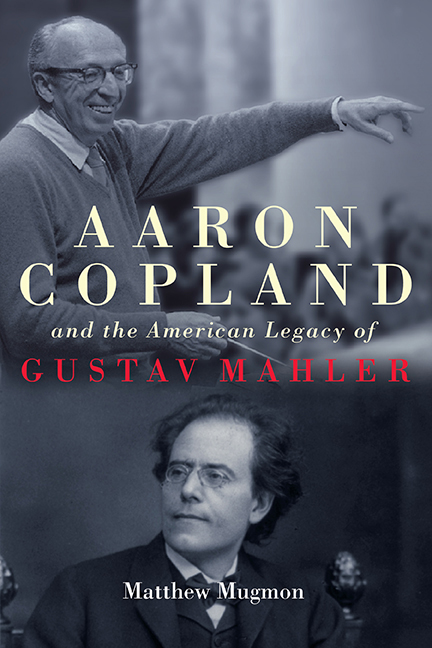Book contents
- Frontmatter
- Dedication
- Contents
- Acknowledgments
- Note on Musical Examples
- Introduction
- 1 Mahler and Copland in New York
- 2 Mahler in Nadia Boulanger's Studio and Beyond
- 3 Copland in Defense of Mahler
- 4 Mahler in Copland's Jewish Romanticism
- 5 Mahler's Idiom in Copland's “American” Sound
- 6 Copland, Koussevitzky, Mahler, and the Canon
- 7 Copland's Role in Bernstein's Mahler Advocacy
- Conclusion
- Notes
- Bibliography
- Index
- Eastman Studies in Music
- Frontmatter
- Dedication
- Contents
- Acknowledgments
- Note on Musical Examples
- Introduction
- 1 Mahler and Copland in New York
- 2 Mahler in Nadia Boulanger's Studio and Beyond
- 3 Copland in Defense of Mahler
- 4 Mahler in Copland's Jewish Romanticism
- 5 Mahler's Idiom in Copland's “American” Sound
- 6 Copland, Koussevitzky, Mahler, and the Canon
- 7 Copland's Role in Bernstein's Mahler Advocacy
- Conclusion
- Notes
- Bibliography
- Index
- Eastman Studies in Music
Summary
This study has considered Copland's Mahler advocacy in several different contexts, including as a student, a teacher, a critic, a composer, an advisor, and a mentor. But Copland also brought Mahler to audiences in the most direct way possible: as a conductor. In the 1950s, quite late in his own career as an established composer, Copland began to conduct major orchestras on a regular basis. Although he is not typically viewed as a composer-conductor today, conducting was an integral part of his musical persona, and one that was closely tied to his composing. Looking back in the mid-1980s, Copland spoke of the intersection between those two activities. “You spend most of your life watching conductors conduct your music,” he said. “Finally you get the feeling that, gee, I'd just like to get up there just once and conduct my music the way I dreamt it…. When I finally got the courage to do it, I found that it was a great source of pleasure.”
For Copland as conductor, Mahler's music served as a bridge between the grand transatlantic romantic tradition and the modernist impulses of the twentieth century. Indeed, Mahler's songs and symphonies appeared in Copland's programs in significant ways that suggested particular linkages among Mahler, American music, and romanticism. One of Copland's apparent favorites was the Adagietto from Mahler's Fifth Symphony. Perhaps following his own advice to “pick and choose among the separate movements” of Mahler's symphonies, Copland conducted the Adagietto worldwide with several orchestras—the Orquestra Sinfônica Brasileira in Rio de Janeiro on July 28, 1962; the Chicago Symphony Orchestra in Ravinia on July 6, 1963; and the New York Philharmonic's Promenade concerts on June 1, 5, and 6, 1973. In these programs he frequently conducted American works alongside Mahler. The Brazil program included Bernstein's Candide overture, Charles Ives's Unanswered Question, Brahms's Variations on a Theme by Haydn, and Copland's own Tender Land Suite and Lincoln Portrait (the latter with Paolo Santos narrating). In the Chicago program, he conducted Berlioz's Roman Carnival Overture, the Brahms Variations, Ives's Unanswered Question, and his own Red Pony suite and Lincoln Portrait (this time with Governor Otto Kerner narrating).
- Type
- Chapter
- Information
- Aaron Copland and the American Legacy of Gustav Mahler , pp. 172 - 174Publisher: Boydell & BrewerPrint publication year: 2019



